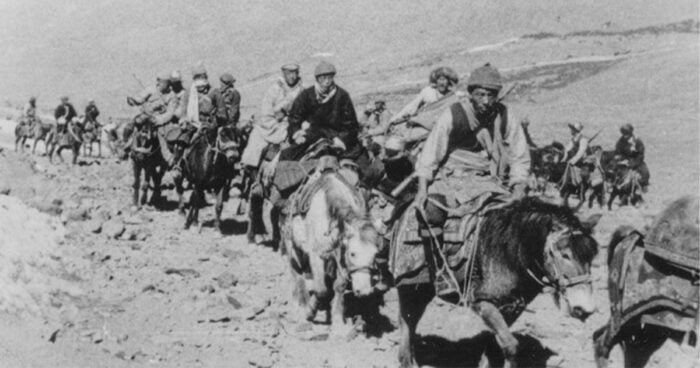
2024 marks the 65th anniversary of Chinese troops seizing full control of Tibet and forcing the Dalai Lama, seen here escaping on horseback, into exile. After 65 years, Tibetans maintain their resilience, hope and struggle to peacefully resolve China’s brutal occupation of their homeland.
2024 marks a milestone in China’s brutal occupation of Tibet—but the Tibetan people’s resilience, hope and struggle to bring that occupation to a peaceful end continue.
The year ahead will see the 65th anniversary of Chinese troops seizing full control of Tibet and forcing the Dalai Lama into exile.
After 65 years, the situation inside Tibet is dire, with Tibet now ranking as the least-free country on Earth alongside South Sudan and Syria, according to the watchdog group Freedom House.
But on the international stage, support for the Tibetan people is growing, including a major bill moving through the US Congress that will pressure China to bring its occupation of Tibet to a peaceful resolution.
The progress of that legislation—known as the Resolve Tibet Act—is just one of several developments to monitor over the next 12 months. Also on the radar are China’s continuing efforts to forcibly assimilate the Tibetan people, the UN’s forum for holding China accountable for its human rights record and the Dalai Lama’s upcoming 89th birthday.
As 2024 gets underway, here are eight things to watch in this new year.
1. The Resolve Tibet Act
This bipartisan legislation—whose full name is the Promoting a Resolution to the Tibet-China Dispute Act—just unanimously passed the House Foreign Affairs Committee in December. That means it can now move to the House floor while simultaneously advancing through the Senate. The bill aims to pressure China’s government to resume dialogue with Tibetan leaders for the first time since 2010 to reach a negotiated resolution of Tibet’s status.
2. China’s UN Universal Periodic Review
On Jan. 23, China will face a Universal Periodic Review at the UN Human Rights Council in Geneva. The UPR is a mechanism for assessing the human rights record of every UN member state every four to five years. Already, over 20 members of the US House have sent a bipartisan letter urging the Biden administration to make sure the US highlights China’s human rights abuses against Tibetans during the UPR.
3. 65th anniversary of the Dalai Lama’s exile
On March 10, 1959, Tibetans rose as one to resist China’s occupation of their country. Although Chinese troops eventually crushed their uprising, the Tibetans succeeded in helping their leader, the Dalai Lama, escape into exile, where he still lives to this day. This year, on the 65th anniversary of the Tibetan National Uprising and the Dalai Lama’s exile, Tibetans will continue to advocate for a peaceful end to China’s brutality in their homeland.
4. State-run boarding schools in Tibet
China has separated over 1 million Tibetan children from their families at state-run boarding schools as part of a policy of forced assimilation, cutting children off from their parents, language and culture and threatening the core of their Tibetan identity. The US has sanctioned Chinese officials for their involvement in the boarding schools, while several nations and UN experts have called for the boarding schools to shut down.
5. 35th birthday of the missing Panchen Lama
Born April 25, 1989, Gedhun Choekyi Nyima is the 11th Panchen Lama, one of the most important figures in Tibetan Buddhism. But just days after he was recognized by the Dalai Lama in 1995, the Chinese government kidnapped the then-6-year-old boy and replaced him with an impostor. As the Panchen Lama turns 35 this year, Tibetan Buddhists and government officials around the world will call for information on his whereabouts and demand his release.
6. China’s attempted renaming of Tibet
China is currently trying to replace the internationally recognized name of Tibet. In official reports and external propaganda, the Chinese government refers to the Tibetan homeland with the Chinese-language word “Xizang.” This name change is a clear attempt to imply that Tibet is a legitimate part of China. In 2024, China is expected to continue this effort incrementally and strategically.
7. Dalai Lama’s 89th birthday
The Tibetan spiritual leader will turn 89 on July 6, with Tibetans, Buddhist practitioners and government leaders across the globe sure to celebrate. Previously, the Dalai Lama has said that around age 90, he would make a decision on his succession. The Chinese government has made clear that it intends to interfere in his succession, but the Dalai Lama has said that China will have no role in the process, and the US has passed legislation threatening to sanction any Chinese officials who attempt to name their own future Dalai Lama.
8. Mass DNA collection
2024 got off to a great start for Tibet activists when Thermo Fisher Scientific, the US-based biotech firm, announced that it had stopped selling DNA collection kits in the Tibet Autonomous Region, an area that spans about half of Tibet. According to reports, China has collected DNA from about 1 million Tibetans in the region without their consent. Thermo Fisher’s decision followed a year of heavy campaigning by Tibet groups—and showed that collective action for Tibet makes a difference.
For more information on any of these stories, contact ICT Communications Officer Ashwin Verghese at [email protected].

